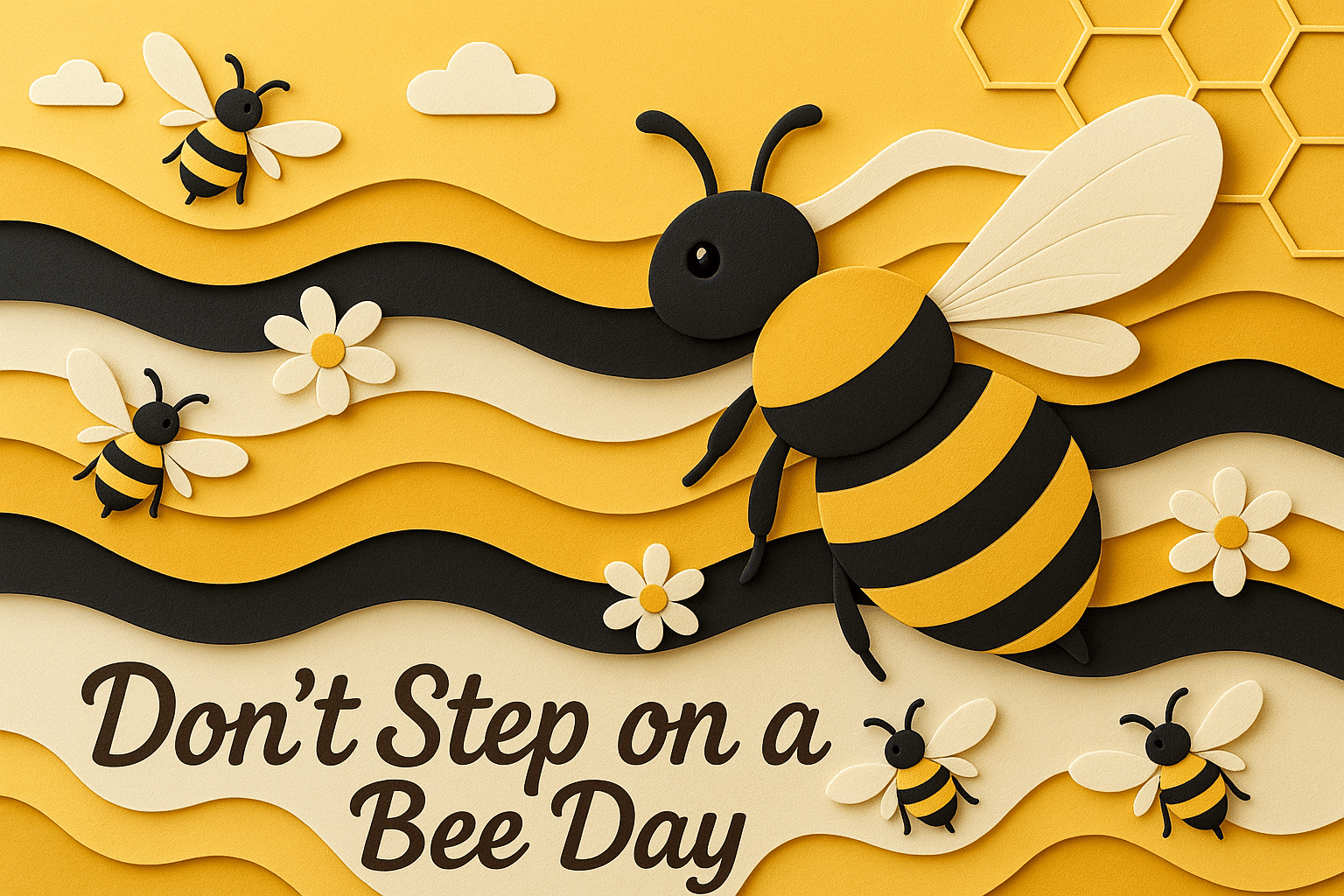What is Don’t Step on a Bee Day?
Don’t Step on a Bee Day is observed every year on July 10 in the United Kingdom. This day raises awareness about the importance of bees and encourages people to treat them with care and respect. Bees play a vital role in pollinating crops, fruits and flowers. Without their help, much of the food we eat would become scarce or disappear. This day reminds people to watch their step outdoors and think twice before disturbing bees in their natural environment.
The goal of this day is not only to protect bees from being accidentally harmed but also to promote a better understanding of their importance. Bee populations are under serious threat due to pesticides, habitat loss, and changing weather. By raising awareness in a lighthearted way, this day encourages people of all ages to take simple actions that support bees. From planting wildflowers to avoiding lawn chemicals, these actions make a real difference. Even small changes in behavior can help bees thrive.
History and Origin
Don’t Step on a Bee Day began in the United Kingdom as a fun and easy-to-remember way to highlight the importance of bees. Its exact origin is unclear, but the day quickly gained popularity among schools, environmental groups, and beekeepers. The idea behind the name is simple: if you’re more aware of bees on the ground, you’ll also be more aware of their role in the world. The date, June 10, fits perfectly with early summer when bees are most active and visible.
Over time, this day has become a useful tool for education and public engagement. Schools use it to teach children about pollination and biodiversity. Community groups run campaigns to protect pollinator habitats. Beekeepers often offer tours or talks around this date to share what goes on inside a hive. Although the day started in the UK, its message has begun to spread to other countries as well. The simplicity of the concept makes it easy for anyone to join in.
Who participates in Don’t Step on a Bee Day?
- Schoolchildren: learn about bee safety and pollination through lessons and outdoor activities
- Gardeners: plant wildflowers and create bee-friendly areas in their yards
- Environmental charities: organize awareness campaigns and habitat restoration events
- Families: take part in nature walks and encourage careful behavior around bees
- Beekeepers: welcome visitors to explore hives and learn about bee care
Slogans and Themes
The slogans for this day are light but impactful. Phrases like “Bee aware,” “Watch your step,” and “Small feet, big impact” are common. These messages focus on mindfulness and gentle behavior in nature. Themes often include pollinator protection, habitat awareness, and community action. Many events use this day to connect people with practical ways to help, such as reducing pesticide use or planting more flowers. The focus stays simple: respect the bee, and the world benefits.
Colors, Symbols and Patterns
Colors
- Yellow: represents the color of bees and the warmth of summer
- Black: reminds us of the bee’s warning stripes and need for caution
- Green: stands for natural spaces and pollinator habitats
Symbols
- Bee: the central figure of the day, symbolizing life, food and balance
- Flower: reminds us of the link between bees and plant life
- Footprint: often used to suggest careful movement in outdoor spaces
Patterns
- Stripes: mimic the bee’s body and appear in many campaign visuals
- Hexagons: reflect the structure of honeycombs and bee architecture
- Floral prints: used in decorations and posters to show pollination themes
Most used hashtags
- #beeday
- #savethebees
- #pollinators
- #beefriendly
- #wildflowers
How do you celebrate Don’t Step on a Bee Day?
- Plant wildflowers: Add native flowers to gardens or balconies to support local bees
- Avoid pesticides: Choose natural options to protect bee health
- Watch your step: Stay aware in grassy or blooming areas where bees are active
- Visit a beekeeper: Learn more about bees and how hives are cared for
- Share bee facts: Use social media to spread helpful information about pollinators
Why is Don’t Step on a Bee Day important?
This day matters because bees are in danger, and we rely on them more than most people realize. Bees help grow the food we eat, maintain healthy ecosystems and support plant life across the planet. Their numbers are falling due to human activity, but small choices can help turn that around. Teaching people to respect bees can lead to better gardens, better harvests and a better environment. Don’t Step on a Bee Day shows how easy it is to protect something so important, just by paying attention.
Features
- Environment Sustainability and Climate
